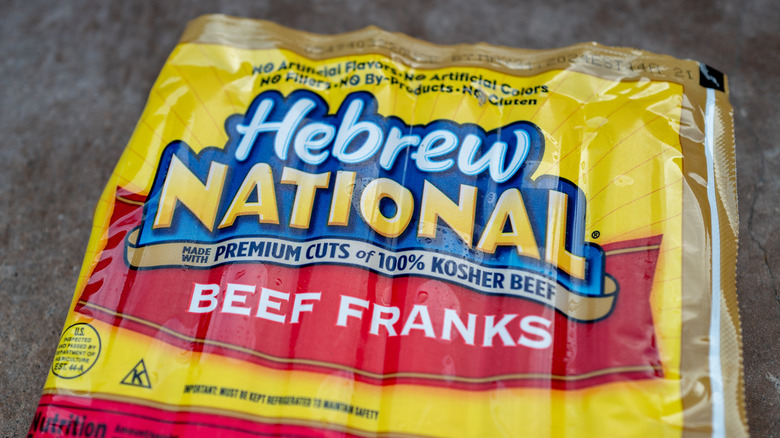The “kosher” label applies to foods that comply with the set of Jewish Dietary Laws laid out in the Torah, which forbid, for instance, consuming pork or shellfish or mixing meat and dairy. According to the Pew Research Center, as of 2020, about 2.4% of the U.S. population identifies as Jewish, and as of 2021, only 17% percent of American Jews keep kosher in the home That means that only about 0.4% of Americans keep kosher.
It’s surprising, then, how popular kosher hot dogs have become among Americans, even those with no connection to Judaism. By far the most recognizable brand of kosher dog is Hebrew National, which, according to the Wall Street Journal, made $170 million in sales in 2020. The National Hot Dog and Sausage Council dedicates a page of their website to kosher hot dogs, which asserts that ¾ of Americans who consume kosher products are not Jewish at all, and in terms of sales, “the kosher hot dog category is growing at twice the rate of the total category.”
The primary distinction of kosher hot dogs is that they’re made with all kosher beef and, obviously, don’t include pork. Their popularity can be explained by savvy marketing, a high-quality product, and a historical perception of kosher butchers as particularly clean.
A clever slogan and good reputation made Hebrew National a leading brand
The timing of the American hot dog’s invention corresponded with a large influx of Ashkenazi Jewish immigrants to New York City’s Lower East Side. Because most of these Jews maintained their religious traditions and diets, kosher butchers and delis were important to the neighborhood. Given the hot dog’s popularity as a working-class street food in New York in the late 19th and early 20th centuries, kosher butchers soon created their own version of the meat. At that same time, meat processing standards were under heavy scrutiny, and even some non-Jews began to view kosher meat as a better option.
Hebrew National was first established in 1905 and went through numerous changes of ownership before being purchased by current owner Conagra Foods in 1993. Much of the brand’s success is credited to its effective marketing campaigns, particularly its use of the slogan, “We answer to a higher authority.” The tagline helped convince Jews and non-Jews alike that its products were trustworthy and of a higher quality than competitors.
Chowhound rated the brand as one of the best hot dogs to buy at the grocery store. Loyal customers with no allegiance to kosher standards often cite the dogs’ salty, garlic-laden flavor as the reason for their preference. Interestingly, though, many Orthodox Jews actually won’t eat the kosher hot dogs due to ongoing debates over the brand’s kosher standards.
This post was originally published on this site be sure to check out more of their content.














































